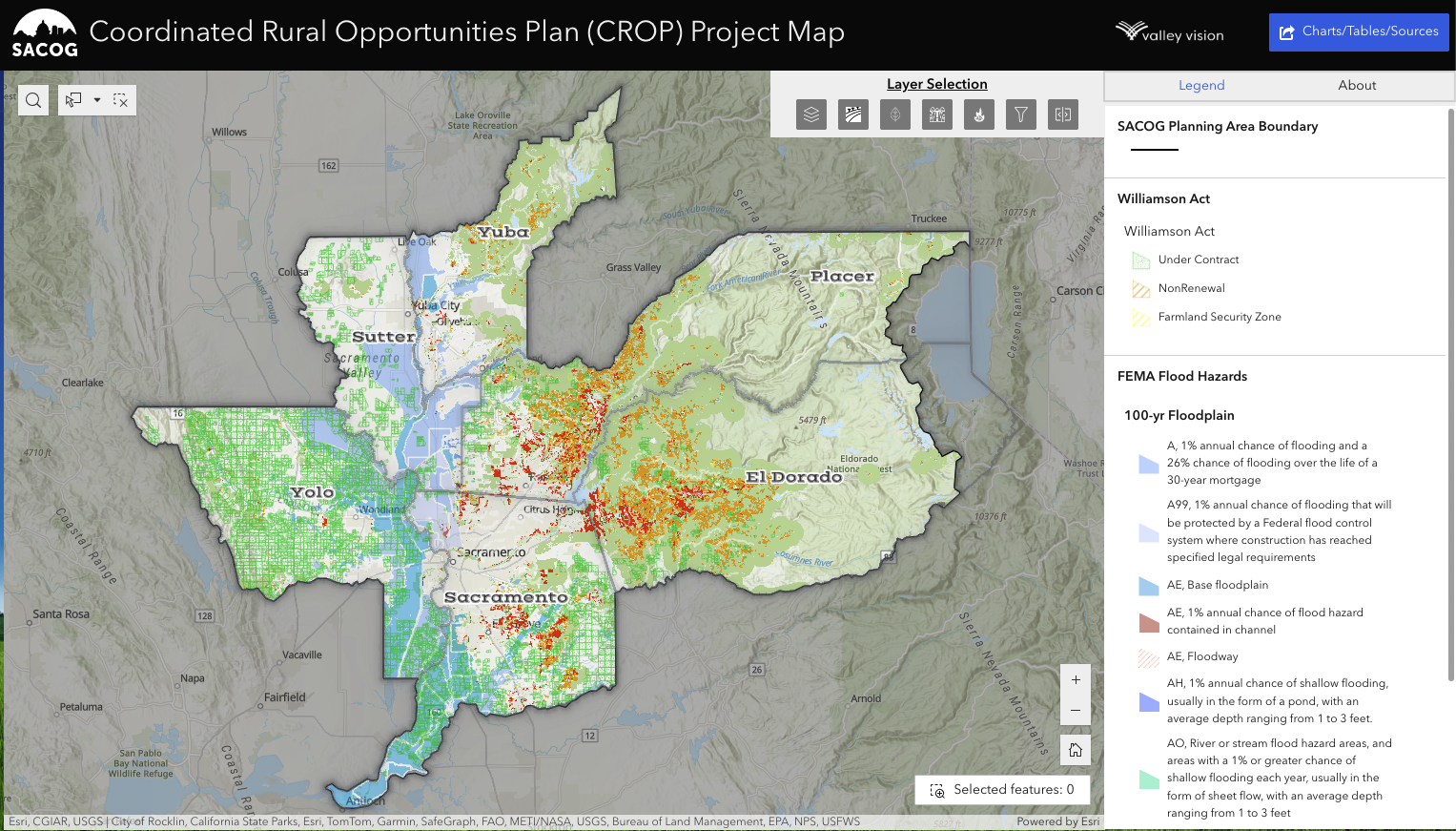Yolo Food Hub Buyer Survey – Executive Summary
As part of the Yolo Food Hub project, this survey collected specific information from institutional buyers in the region. The results will allow the Yolo Food Hub Network to create a facility that is equitable, sustainable, and offers a wide range of valuable services to consumers and producers. The results will also inform the feasibility study of the Yolo Food Hub as well as the business plan.
Coordinated Rural Opportunity Plan

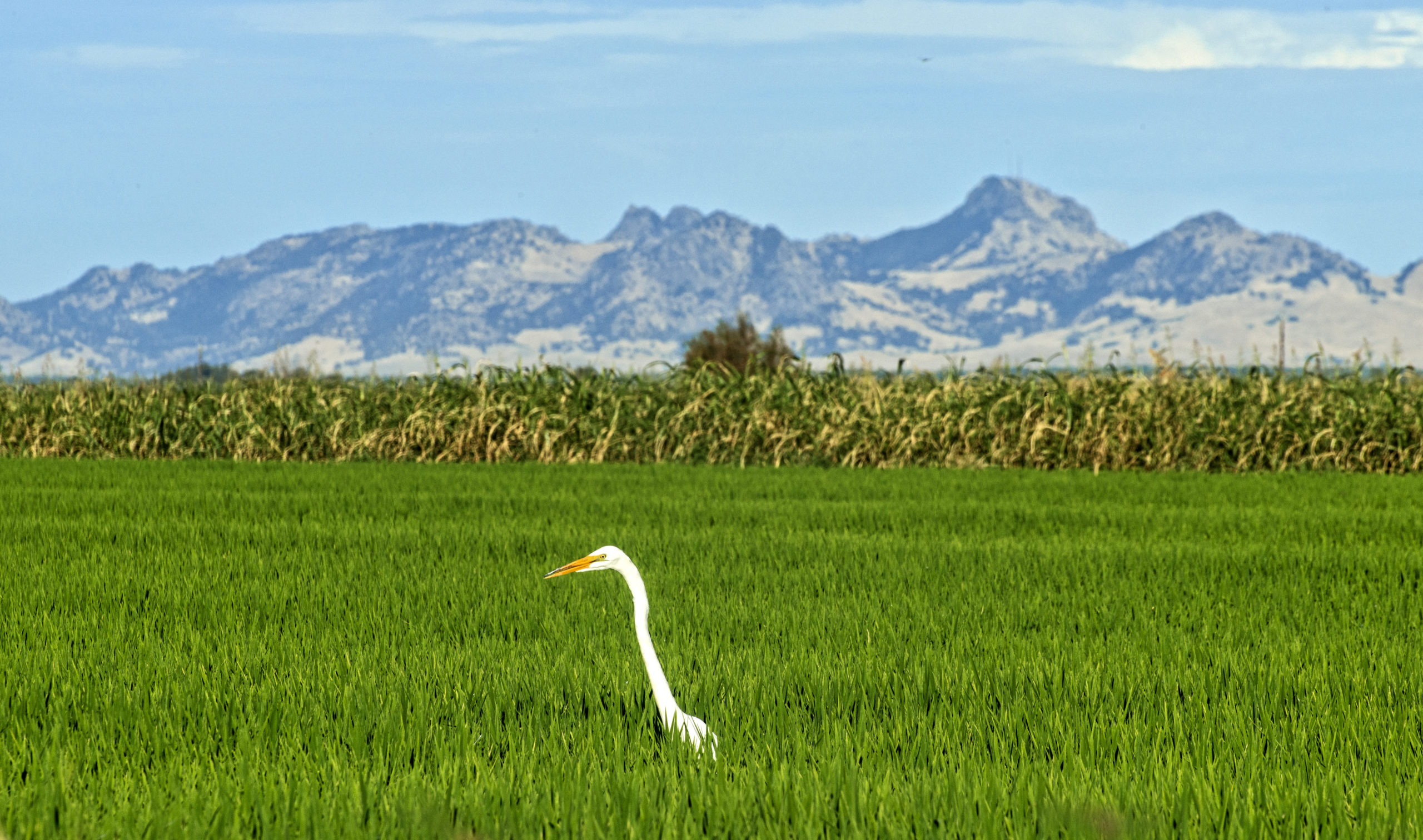
The Coordinated Rural Opportunities Plan (CROP) is funded by the Department of Conservation’s Sustainable Agricultural Lands Conservation (SALC) Program. CROP is a joint effort between the Sacramento Area Council of Governments (SACOG) and Valley Vision. CROP is the next phase of SACOG’s groundbreaking Rural-Urban Connections Strategy (RUCS) to enhance rural economies and the natural assets that drive them across the six-county Sacramento region: El Dorado, Placer, Sacramento, Sutter, Yolo, and Yuba counties.
The Coordinated Rural Opportunities Plan provides county and regional leaders the opportunity to address infrastructure investment challenges and collectively come together on solutions, including policies and investments, that will support the region’s agricultural sustainability and long-term economic health and resiliency
CROP includes a comprehensive profile of each county that identifies priority areas for infrastructure investments and programs to strengthen the region’s food and agricultural cluster. The profiles include examples of innovative models that can be leveraged across the region for shared solutions and potential resources to meet vital infrastructure needs. CROP also includes a Regional Profile that summarizes key highlights from the county profiles.
CROP Profiles
Sacramento Region CROP Profile
CROP has defined needed food and agriculture infrastructure as physical investments, policy recommendations, and promising models in four interrelated areas: water, land use and housing, transportation and broadband, and food system and governance.
Food System Infrastructure

CROP Thematic Areas
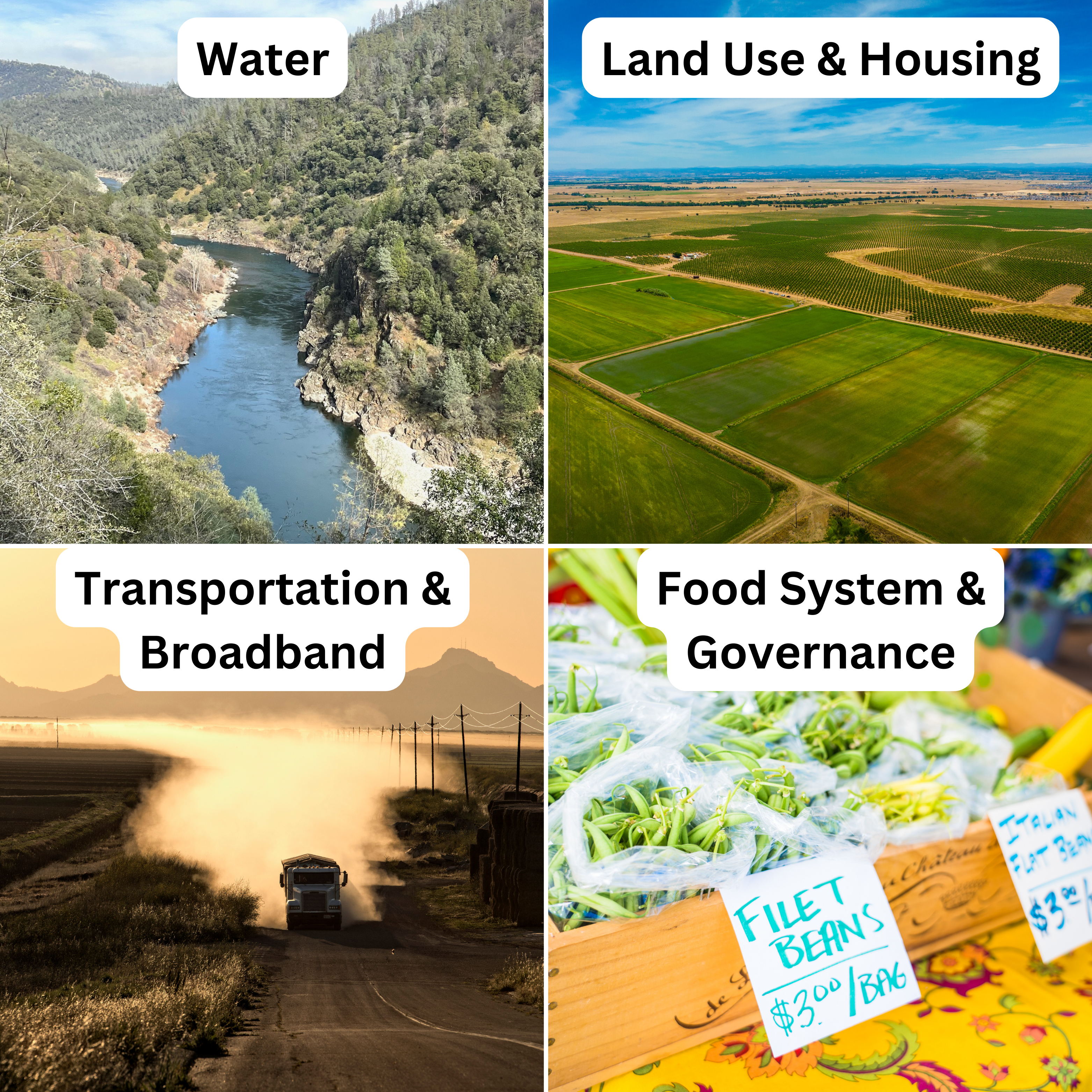
CROP Map
Collectively, the six-county region has a rich agricultural history that provides a treasured legacy for residents and a strong regional identity. CROP has shown agriculture continues to have a bright future in the region: we have some of the most productive farmland in the world, highly skilled and knowledgeable farmers, water, and climate assets, supporting institutions, and a wide diversity of high-value crops. Through these models, policy, and recommendations, CROP aims to promote public and private sector investment in infrastructure and programs that strengthen the economic, social, and environmental contributions of the region’s food system, preserving the central role agriculture plays in the future.
Background
Agriculture Has Deep Roots in the Sacramento Region
The counties of El Dorado, Placer, Sacramento, Sutter, Yolo, and Yuba have a rich history in agriculture that provides a treasured legacy for residents and a strong regional identity. As the foundation of a food and agricultural economy valued at more than $12 billion, agriculture can have a bright future given that we have some of the most productive farmland in the world, highly skilled farmers, water and climate assets, a wide diversity of high-value crops, and UC Davis, one of the world’s premier agricultural institutions.
Agriculture is an Economic Driver
The region’s Prosperity Strategy outlines a strategic framework and bridge to action for the six-county region that prioritizes our core economic initiatives, aimed at advancing a more aligned, prosperous, inclusive, and resilient Sacramento region. The Prosperity Strategy includes initiatives to support the region’s tradeable industries – groups of related industries that support economic output through exporting goods or services. These industries are critical for local prosperity because of their ability to improve productivity and bring in wealth from outside the region through competitive economic advantage.
Agriculture is the foundation of our region’s most distinct tradeable industry – the food and agriculture cluster – comprised of crop production; packaging and processing; distribution; and support industries. Together, this cluster provides more than 55,000 direct jobs, putting the Sacramento region in the top fifth of large metropolitan areas in the country when it comes to sustaining a robust agricultural economy. The supply chain that generates our food and ag economy is deep, with its own unique networks and dependent sectors. As America’s Farm-to-Fork Capital, the Sacramento Region is both fertile and productive, with $2 billion in farm gate output value, more than 7,200 farms, and more than 1.5 million acres of harvested farmland. The overall cluster has an economic impact of more than $12 billion.
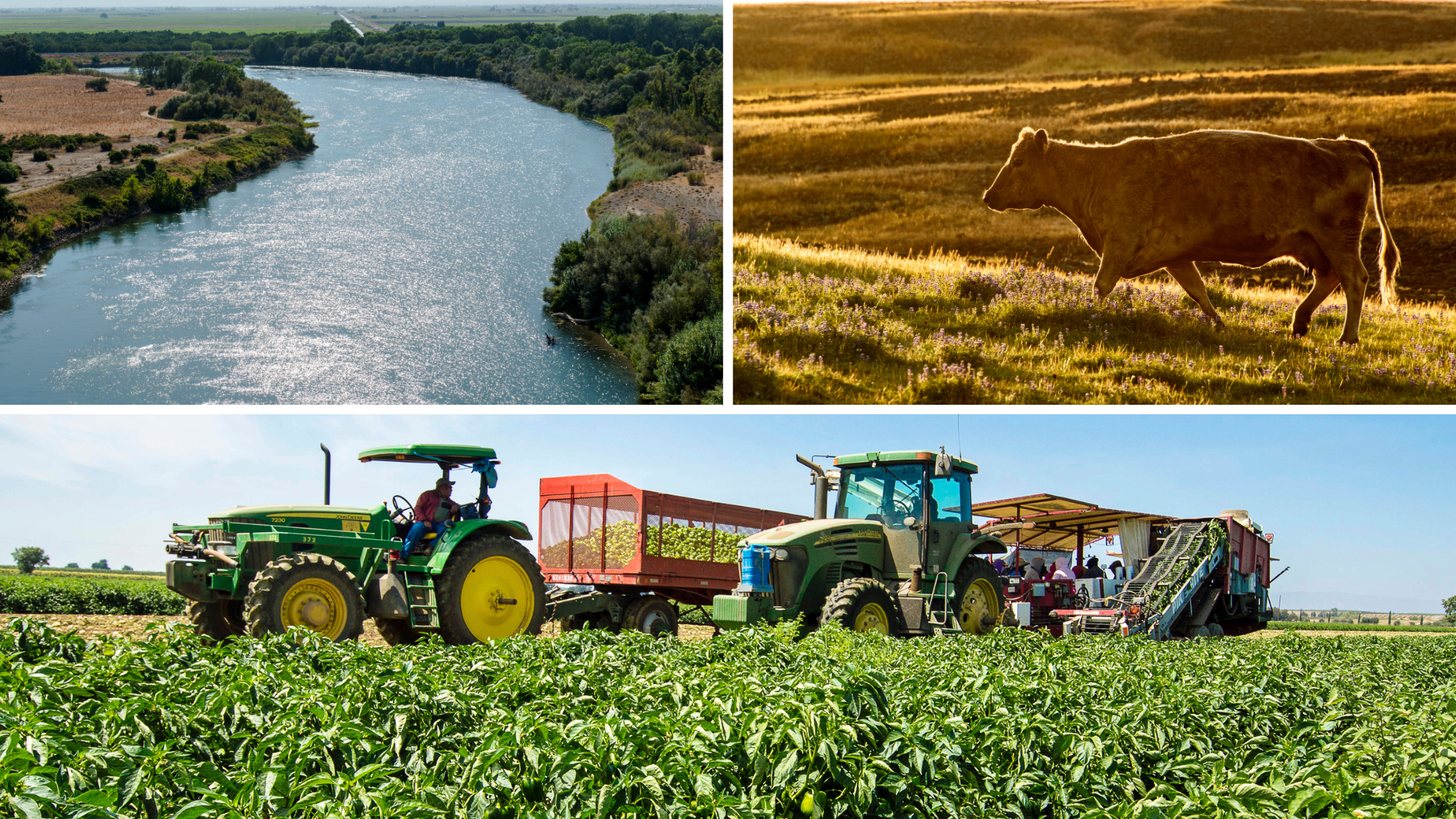
CROP is funded by the Department of Conservation’s Sustainable Agricultural Lands Conservation (SALC) Program. List of references and CROP stakeholders can be found here.
Should you have any questions, or if you want to get involved, please reach out to Grace Kaufman at Grace.Kaufman@ValleyVision.org
Yolo Food Hub Network – Esparto Facility Barn Warming and Community Celebration
Join the Yolo Food Hub Network as we celebrate the acquisition of our new site in Esparto!
About this event
The Yolo Food Hub Network (YFHN) invites you to attend a Barn-Warming in the historic 22,000 sq ft Oakdale Barn, part of a five-acre property New Season Community Development Corporation recently purchased on behalf of YFHN in Esparto!
The property will serve as the facility anchor for the Yolo Food Hub Network. The building will provide storage space and other needed support infrastructure and will support regional farms and ranches to diversify their market opportunities across the region. The goal of the facility is to eventually provide distribution, storage, processing, and packing services. The Yolo Food Hub Network’s facility in Esparto will also increase consumer and buyer access to healthy and diverse local foods, improve farmer and market sales, and strengthen relationships between farmers, institutions, and local communities.
Attendees of the celebration will include Yolo Food Hub Network partners, community leaders, elected officials, and other collaborators who are passionate about local food systems. Come learn more about the Yolo Food Hub Network and celebrate with us Friday, October 21st from 2:00 PM – 6:00 PM at 17720 Oakdale Ranch Road Esparto, CA 95627. The event will be co-sponsored by Slow Food Yolo, which will provide local food for attendees. Registration is required for planning purposes.
MORE INFORMATION YOLO FOOD HUB NETWORK
The Yolo Food Hub Network formed in 2021 with the goal to establish a new food hub facility in Yolo County that supports local and regional agriculture production, purchasing, and consumption. The Yolo Food Hub Network expects the facility to expand food production and distribution channels in Yolo County and in the Greater Sacramento Region, while at the same time improving healthy food access, stabilizing food markets, increasing employment and job training opportunities, and providing pandemic relief for farmers, particularly for BIPOC and historically underserved communities.
The Yolo Food Hub Network project team includes: New Season Community Development Corporation (NSCDC), Capay Valley Farm Shop (CVFS), Yolo Food Bank, Durst Organic Growers, Spork Food Hub, Esparto Train Station, Hatamiya Group, Kitchen Table Advisors, and Valley Vision as the project manager.
We encourage organizations and individuals who are passionate about the local and regional food system, to join us for this exciting event on Friday, October 21st from 2:00 PM – 6:00 PM.
MORE INFORMATION ABOUT SLOW FOOD YOLO
Slow Food is a global, grassroots organization, founded in 1989 to prevent the disappearance of local food cultures and traditions, counteract the rise of fast life and combat people’s dwindling interest in the food they eat, where it comes from and how our food choices affect the world around us. Since its beginnings, Slow Food has grown into a global movement involving millions of people in over 160 countries, working to ensure everyone has access to good, clean and fair food. Slow Food believes food is tied to many other aspects of life, including culture, politics, agriculture and the environment. Through our food choices we can collectively influence how food is cultivated, produced and distributed, and change the world as a result.
Slow Food Yolo is excited to collaborate in sponsoring the Barn Warming and re-launching our chapter once again. Our wish is that this facility will educate the next few generations on the importance of building local food systems.
CONTACT
Please contact Grace.Kaufman@ValleyVision.org with any questions about the Barn-Warming. If you’d like instructions on how to place orders from local farms, contact Spork Food Hub (sporkfoodhub@gmail.com) or Capay Valley Farm Shop (tracy@capayvalleyfarmshop.com).
White House Conference – Recommendations from America’s Farm-to-Fork Capital
This document summarizes key issues and recommendations from more than 75 community partners in the Greater Sacramento region who gathered at an input session for the September 15th, 2022 White House Conference on Hunger, Nutrition, and Health. The session was convened by Valley Vision, in partnership with the Sacramento Region Community Foundation and Mulvaney’s B&L. Organized under the banner of our community food system network “We are Farm to Fork,” participants included a vibrant cross-section of over 75 leaders representing food banks, restaurants, school districts, nonprofits, local, state, and federal agencies, tribal and many more.
Yolo Food Hub Network Webinar: Sharing an update on the Esparto Facility & results of the buyer survey
Join the Yolo Food Hub Network for an informative webinar!
ABOUT THE WEBINAR
Participants will hear an update from the Yolo Food Hub Network (YFHN) on the recently acquired, five-acre property, including the improvements needed to retrofit the YFHN’s 22,000 sq ft building. The building will serve as the facility anchor in Esparto for the Yolo Food Hub Network and will provide distribution, storage, processing, and packing services, supporting regional farms and ranches in reaching new markets across the region. Participants will also hear the results from Yolo Food Hub Network’s second survey, which collected specific information from institutional buyers who may be interested in purchasing local and fresh produce from the Yolo Food Hub Network, including Spork Food Hub, Capay Valley Farm Shop, and other Yolo County Farms, all of whom are part of the YFHN and currently operate in Yolo County. These results will enable the Yolo Food Hub Network to strengthen local supply chains and to develop a facility that is equitable, sustainable, and offers a wide range of valuable services to consumers and producers. The survey will inform the business plan for the YFHN.
MORE ABOUT YOLO FOOD HUB NETWORK
The Yolo Food Hub Network formed in 2021 with the goal to establish a new food hub facility in Yolo County that supports local and regional agriculture production, purchasing, and consumption. The Yolo Food Hub Network expects the facility to expand food production and distribution channels in Yolo County and in the Greater Sacramento Region, while at the same time improving healthy food access, stabilizing food markets, increasing employment and job training opportunities, and providing pandemic relief for farmers, particularly for BIPOC and historically underserved communities.
CONTACT
Please contact Grace.Kaufman@ValleyVision.org with any questions and contact Spork Food Hub (sporkfoodhub@gmail.com) or Capay Valley Farm Shop (tracy@capayvalleyfarmshop.com) for instructions on how to place orders from local farms.
We Are Farm 2 Fork: Sacramento Region Session on Hunger, Nutrition, & Health
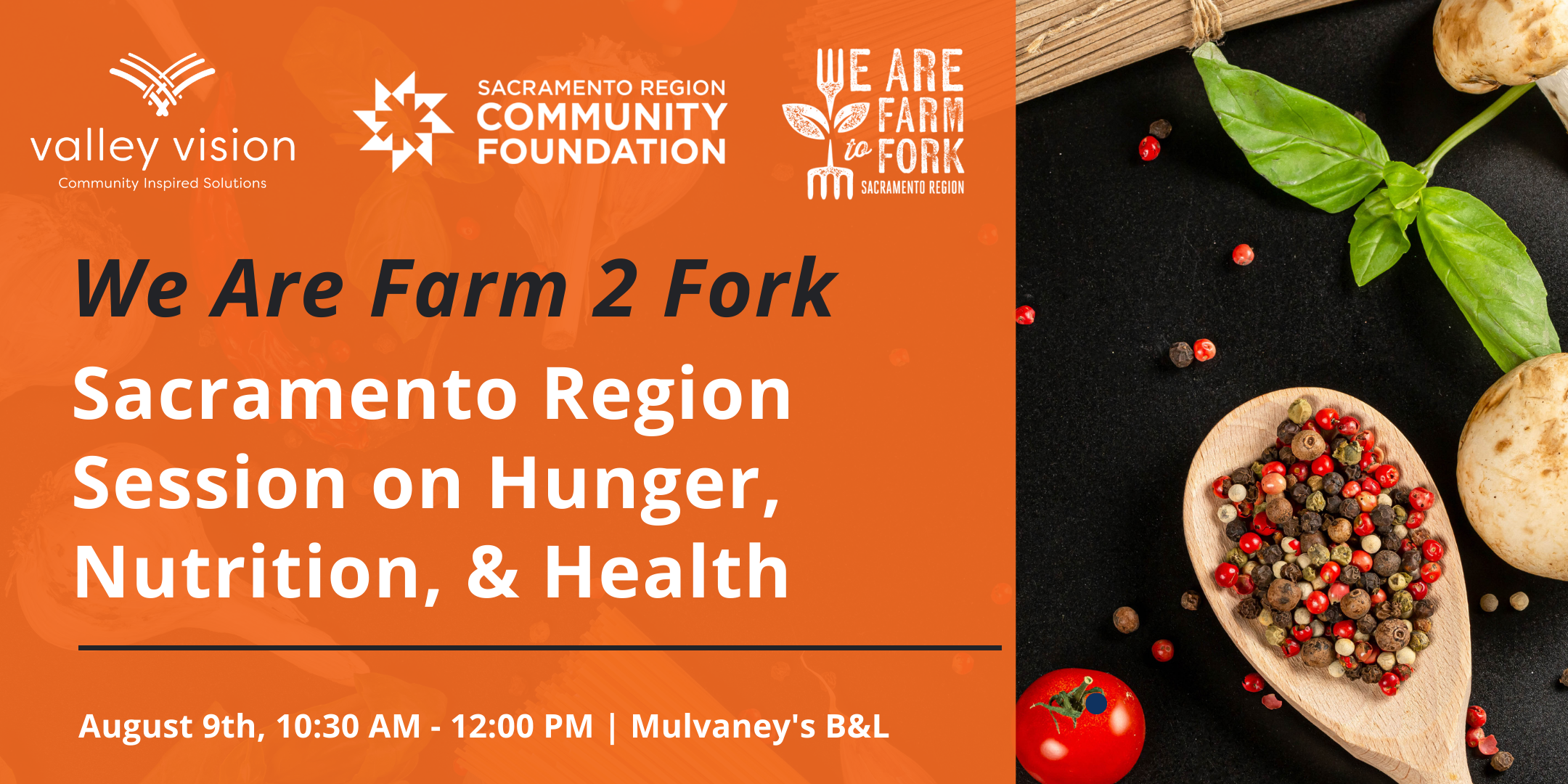
Help inform the 2022 White House Conference on Hunger, Nutrition and Health!
Valley Vision and the Sacramento Region Community Foundation invite you to join our community partners and attend a We are Farm to Fork discussion for the Sacramento Region. This discussion will help inform the upcoming 2022 White House Conference on Hunger, Nutrition, and Health leading to a national strategy with solutions to address these challenges. The discussion will take place in person on Tuesday, August 9th from 10:30 AM – 12:00 PM at Mulvaney’s B&L. Registration is required and space is limited.
MORE INFORMATION ABOUT THE CONFERENCE
On May 4, President Biden announced that for the first time in over 50 years, the White House will host a Conference on Hunger, Nutrition and Health in September. The Conference, and the preparatory work leading up to it, will accelerate progress and drive significant change to end hunger, improve nutrition and physical activity, reduce diet-related disease, and close the disparities around them.
Prior to the conference, the White House has called for regional partner-led convenings to gather ideas and recommendations, reflecting a wide range of stakeholder views, on how the federal government can support efforts at the regional and local levels. America’s Farm to Fork Capital pivoted quickly during the pandemic to create innovative and effective programs. Valley Vision, along with several partner organizations, is convening a discussion to showcase the region’s innovative solutions, models and programs. Participants will hear about recent efforts made by local and regional organizations to strengthen the resilience of the regional food system, and contribute to the region’s input for the White House Conference. The August 9th listening session will build upon community stakeholder input from Valley Vision’s 2021 Sacramento Region Food System Action Plan, prepared in partnership with the Sacramento Region Community Foundation.
We encourage organizations and individuals who are passionate about hunger, nutrition, and health to join us for this important discussion on Tuesday, August 9th from 10:30 AM – 12 PM.
Please reach out to Grace.Kaufman@ValleyVision.org should you have any questions.
Yolo Food Hub Grower Survey – Executive Summary
As part of the Yolo Food Hub project, this survey collected specific information from growers in the region. The results will allow the Yolo Food Hub project partners to create a facility that is equitable, sustainable, and offers a wide range of valuable services to consumers and producers. The results will also inform the feasibility study of the Yolo Food Hub as well as the business plan.
Yolo Food Hub – Sharing Results of the Grower Survey
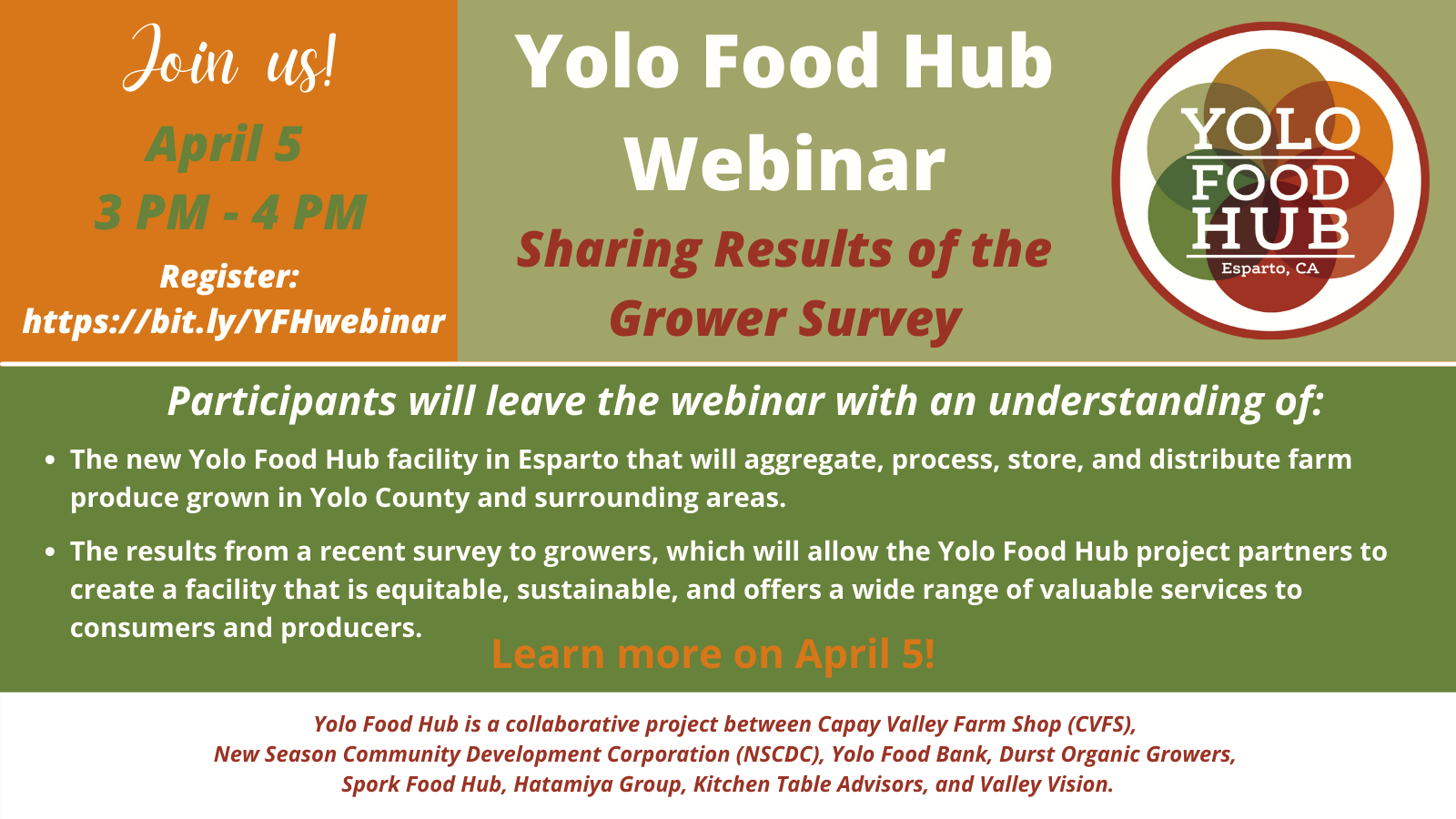
ABOUT THE WEBINAR
Join the Yolo Food Hub project team at an upcoming interactive webinar on Tuesday, April 5th from 3 PM – 4 PM. Participants will learn more about the Yolo Food Hub and the results from a recent survey, which seeks to collect specific information from growers in the region. The survey results will allow the Yolo Food Hub project partners to create a facility that is equitable, sustainable, and offers a wide range of valuable services to consumers and producers. The survey will also inform the feasibility study of the Yolo Food Hub as well as the business plan.
MORE ABOUT YOLO FOOD HUB
Yolo Food Hub is a new facility that will aggregate, process, store, and distribute farm produce grown in Yolo County and surrounding areas. Located in Esparto, Yolo Food Hub will connect small, economically disadvantaged, Veteran, and BIPOC farmers to new markets and improve the resiliency of the regional food system by strengthening local supply chains. In addition, Yolo Food Hub will expand food production and develop new market opportunities in Yolo County and the Greater Sacramento Region, while at the same time bolstering local food security, increasing employment and job training opportunities, and providing pandemic relief for farmers, consumers, and institutional buyers.
WHO SHOULD ATTEND?
This webinar is open to the public. We strongly encourage growers, school nutrition service providers, farm bureaus, community college and universities, hospitals, and other public agency staff (cities, counties, regional agencies, special districts, etc.), elected officials, non-profit and labor organizations, community-based organizations, private consulting firms, advocacy groups, students, and individuals interested in learning about the Yolo Food Hub or the food system to attend this engaging and informative event.
CONTACT
Please contact Grace.Kaufman@ValleyVision.org with any questions.
Yolo Food Hub Network
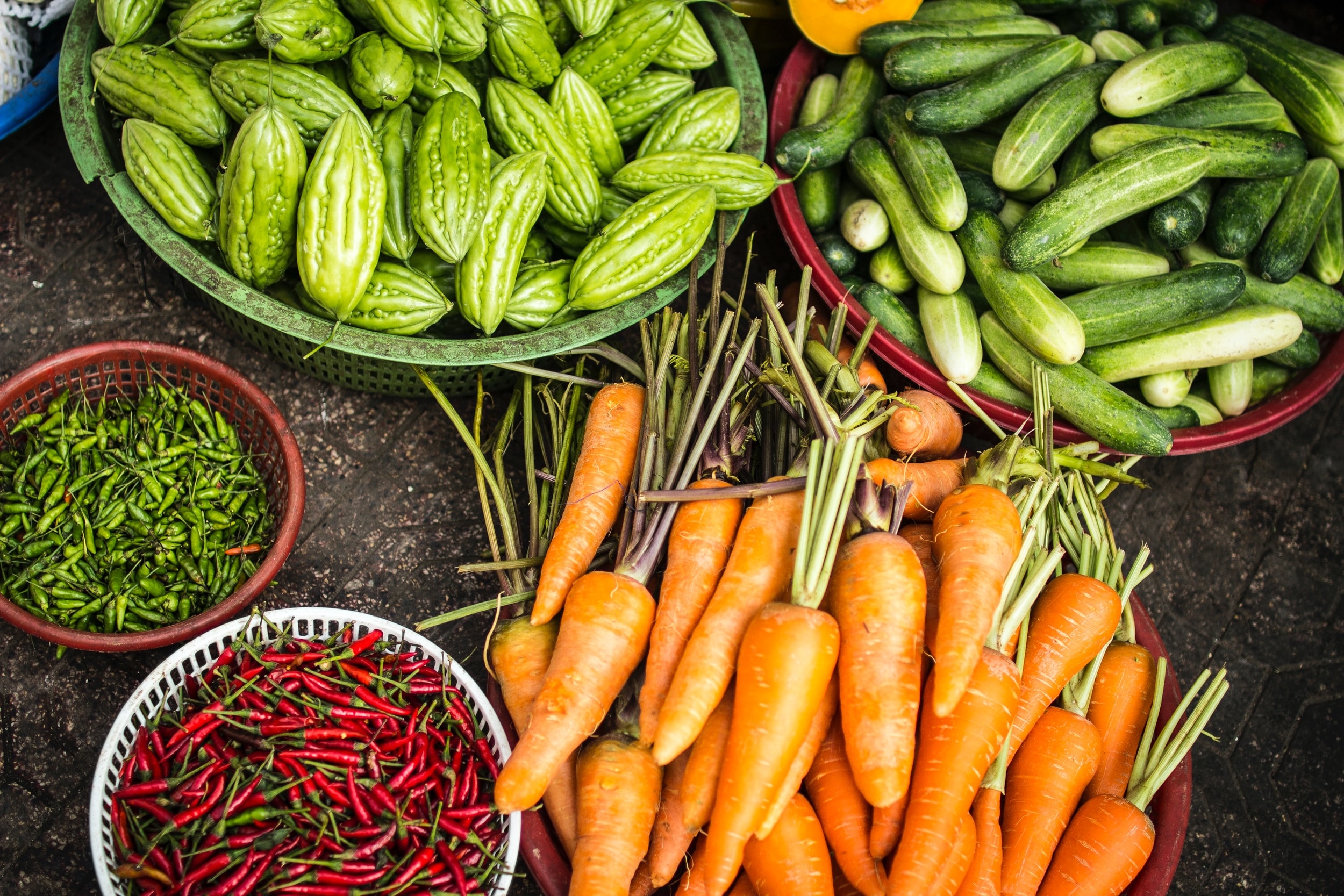
Resources
- YOLO FOOD HUB FACILITY REPORT
- SUMMARY OF BUYER SURVEY
- FALL 2022 YFHN WEBINAR RECORDING
- SUMMARY OF GROWER SURVEY
- SPRING 2022 YFHN WEBINAR RECORDING
- Self-reported food insecurity was higher in the Farm to Fork Capital than the U.S. average overall and disparities in access exist along racial and economic lines. Key supports, such as federal stimulus checks during the pandemic, provided important means of increasing food security during a hard time.
- Even though they live in the Farm to Fork Capital, many residents in the region have not had opportunities to grow their own food or participate in local food and agriculture activities.
- About half of respondents have knowingly purchased local food, grown within 100 miles of home, however this practice is more likely among white, older, and higher income respondents.
- Respondents highly value wild, open lands and farmland, and enjoy living in an area with farms and agriculture.
- Overall, the Farm to Fork brand is a popular one, however Latino respondents as well as those who live in cities were less enthusiastic.
- About half of respondents admit to regularly throwing out food, however, the same amount support paying a fee of at least $5 a month in their utility bill to support food recovery programs that could reduce food waste and hunger.
- The vast majority of respondents are concerned that climate change poses a real risk to growing food in our region.
The Yolo Food Hub Network (YFHN) formed in 2021 with the goal to establish a new food hub facility in Yolo County that supports local and regional agriculture production, purchasing, and consumption. The new facility, located in Esparto, will aggregate, process, store, and distribute farm produce grown in Yolo County and surrounding areas on behalf of farmers in the area. The Yolo Food Hub Network expects the facility to expand food production and distribution channels in Yolo County and in the Greater Sacramento Region, while at the same time improving healthy food access, stabilizing food markets, increasing employment and job training opportunities, and providing pandemic relief for farmers, particularly for BIPOC and historically underserved communities.
Valley Vision, on behalf of several local partners, have been awarded a grant through a Local Food Promotion Program grant from USDA for the planning phase of the project. The total cost of developing Yolo Food Hub Network’s facility is estimated at $10 million, $2 million of which has been committed by Yolo County for site acquisition.
Food hubs help connect farmers and food entrepreneurs with regional markets and institutional buyers, such as schools, hospitals, and food banks to access source-identified, locally grown products. The first phase of the project includes developing recommendations and a funding strategy to help establish and sustain the new Yolo Food Hub Network and facility. As part of the planning phase of the Yolo Food Hub Network, this project will help farmers receive training on how to reach institutional buyers, such as schools, hospitals, and restaurants, which will buy produce and goods from Yolo Food Hub Network partners.
The Yolo Food Hub Network and its facility are identified as a priority recommendation of the 2021 Sacramento Region Food System Action Plan-which is to build a network of food hubs to connect farmers to markets and increase institutional procurement. The Yolo Food Hub Network and facility builds upon the 2014 food hub feasibility analysis conducted by SACOG through the Rural-Urban Connections Strategy (RUCS). The Yolo Food Hub Network is a collaborative effort and supports several other food hubs in the region, including Spork Food Hub and the Capay Valley Farm Shop.
The Yolo Food Network will help create market opportunities that local farmers need to better serve regional markets by providing services such as processing, distribution, storage, and packing. The Yolo Food Hub Network’s facility in Esparto will also increase consumer and buyer access to healthy and diverse local foods, improve farmer and market sales, and strengthen relationships between farmers, institutions, and local communities.
The Yolo Food Hub Network project team includes: New Season Community Development Corporation (NSCDC), Capay Valley Farm Shop (CVFS), Yolo Food Bank, Durst Organic Growers, Spork Food Hub, Esparto Train Station, Hatamiya Group, Kitchen Table Advisors, and Valley Vision as the project manager.
For questions about Yolo Food Hub Network, the facility, or how to get involved, please contact Grace Kaufman at Grace.Kaufman@ValleyVision.org.
Sacramento Region Food System Action Plan (2021)
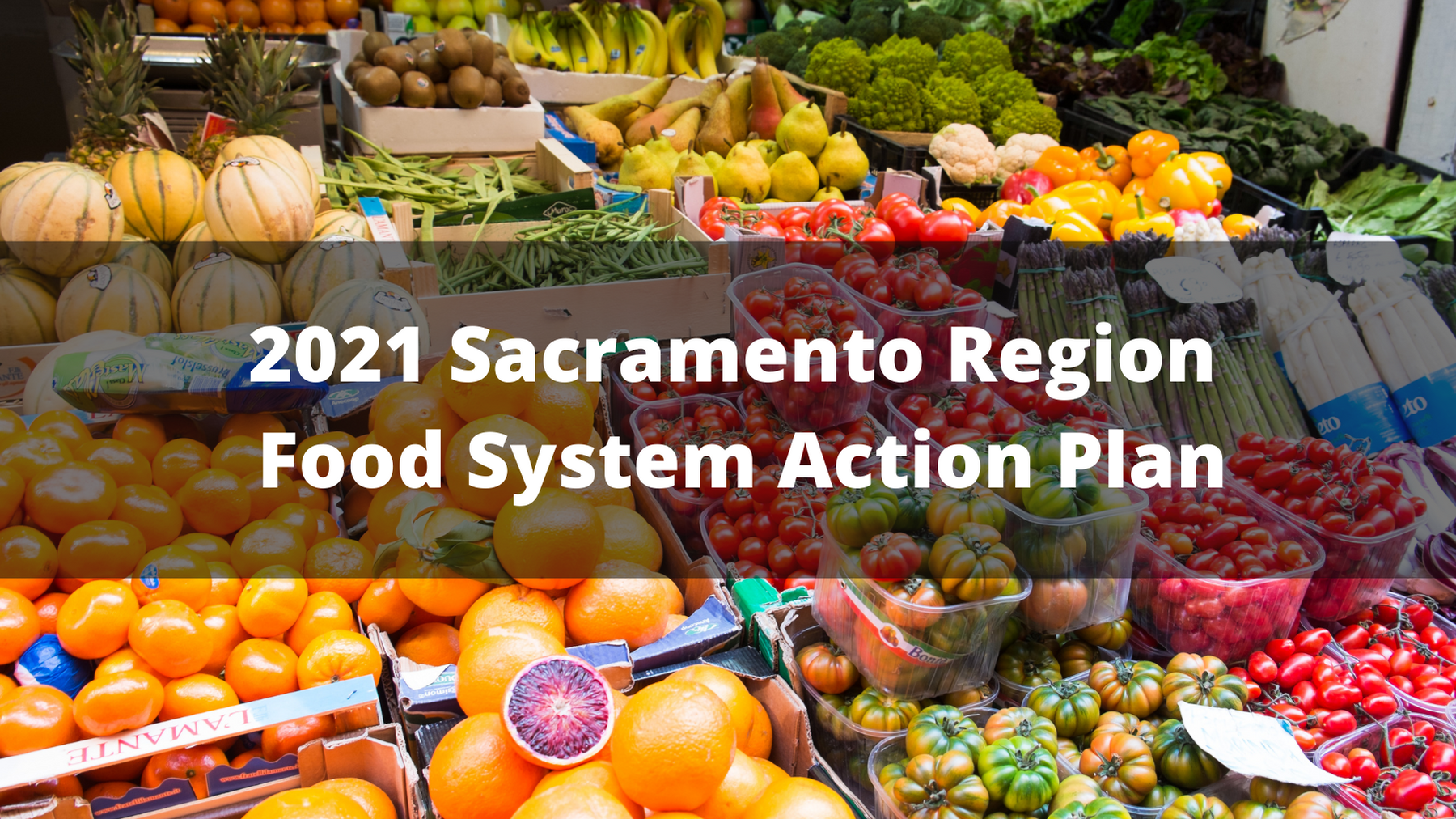
The Greater Sacramento region is at the heart of one of the world’s largest agricultural economies, producing products for people at home and around the globe. With its renowned food and agricultural assets, the region produces a large diversity of high-quality crops and products and values its agricultural heritage, while looking to the future as a global innovator and leader in sustainable agriculture, food, and health.
Yet, in spite of our great abundance, the region experiences persistent levels of food insecurity, lack of access to healthy affordable foods, and lack of equitable access to economic opportunities, among other conditions. The Sacramento Region Community Foundation (Foundation) engaged Valley Vision to prepare phase one of the 2021 Sacramento Region Food System Action Plan (Regional Action Plan), which assesses the capital area’s food landscape and offers recommendations to grow its capacity and resilience – efforts made more urgent by ongoing health and climate crises.
The project team also developed an eight-page document (below) containing summaries of key assets, challenges, and recommendations across the six strategic focus areas in the full Regional Action Plan (above).
Companion research and analysis on regional food security status, community food guides prepared by UC Davis, and a listing of new and expanded state and federal resources that can support recommendations and actions are available on Valley Vision’s website.
To stay engaged and informed about the Regional Action Plan and Phase Two, email us at FoodAndAg@ValleyVision.org.
The Food System Resilience Poll (October 2021)
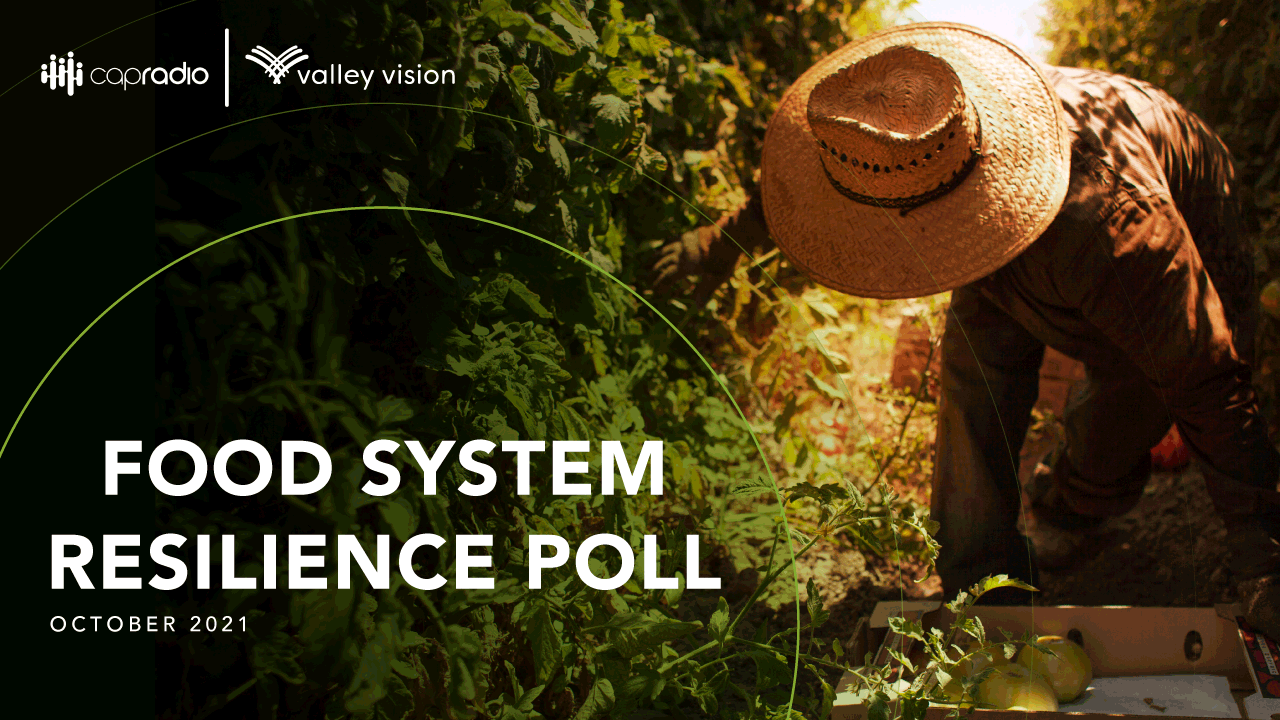
Through the lens of our farm to fork brand and knowing that we face real challenges, this Food System Resilience Poll sets out to explore people’s perceptions around our food system and the connections between food, farm, and community. It also seeks to understand the ways in which the pandemic affected access to food, knowing that millions of people in our country already struggled with getting enough food even before the pandemic. With all the food and agricultural assets that we have, do the lived experiences of our region’s residents reflect our vision for what a farm to fork region should be?
The Poll, which was fielded by Valley Vision and CapRadio, in partnership with the Institute for Social Research at Sacramento State, is designed to help inform system work to build an equitable and accessible farm to fork culture that resonates and benefits all communities. The results helped inform the Sacramento Region Community Foundation’s 2021 Food System Action Plan, a robust set of strategies and tactics to guide industry leaders, policy makers, universities, and community groups toward actions that achieve more inclusive, supported, sustainable, and equitable food system practices (expected to be released in October 2021).
Some of the Poll’s most notable findings are:
FSAP Listening Session | Food Economy
The Food System Action Plan (FSAP) is a regional food system investment strategy that will identify best practices, priorities, prevailing challenges, opportunities, and funding recommendations related to the region’s food system for the communities of El Dorado, Placer, Sacramento, and Yolo Counties. The goal is to increase the vitality of the region’s food system and to identify financing strategies and mechanisms to support a more equitable and accessible food system for all residents of the Greater Sacramento Region.
Valley Vision is convening listening and input sessions in topical areas as an opportunity to identify funding, capacity, and resource needs in the region’s Food System. The sessions are open to all interested and will directly inform the 2021 Food System Action Plan.
This session, Food Economy, will cover local market development, institutional procurement (Farm to School, Farm to Hospital, local purchasing policies, etc.); food hubs, food incubators, school central kitchens, etc.; agritourism; new food products/food entrepreneurs, agrifoodtech innovation and other related topics.
